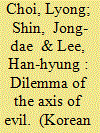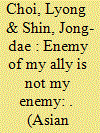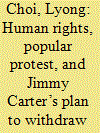|
|
|
Sort Order |
|
|
|
Items / Page
|
|
|
|
|
|
|
| Srl | Item |
| 1 |
ID:
169153


|
|
|
|
|
| Summary/Abstract |
This research examines the international relations between North Korea (the
Democratic People’s Republic of Korea or DPRK) and Iran in the context of their
shared perception of a threat from the United States. We discuss the conventional
idea of the international relationship—the enemy of my enemy is my ally—to
explain Pyongyang–Tehran relations, evaluate its past and current relations, and
offer policy suggestions for the recent denuclearization approach toward North
Korea and Iran. Using newly discovered archival resources and political records, we
challenge the conventional idea that the two states share the same threat perception
in a consistent manner and suggest the level of their military cooperation changes
depending on the approach from Washington and the international community. This
research provides a more exact picture of the international relations North Korea
and Iran since the 1980s and of the link between their shared threat perception and
denuclearization debates.
|
|
|
|
|
|
|
|
|
|
|
|
|
|
|
|
| 2 |
ID:
154649


|
|
|
|
|
| Summary/Abstract |
In this article we examine the exceptional case of South Korea's establishment of cooperative relations with Iran, despite the latter's confrontation with the United States, South Korea's closest ally, in the late 1970s and early 1980s. We discuss the conventional idea of the imbalanced relationship—the enemy of my ally is not my enemy—to explain South Korea's approach toward Iran, evaluate its past and current relations, and offer policy suggestions for the future relationship between the two countries. Using newly discovered archival resources and political records from South Korea, we provide a more exact picture of the international relations among South Korea, Iran, and the United States in the early 1980s.
|
|
|
|
|
|
|
|
|
|
|
|
|
|
|
|
| 3 |
ID:
156348


|
|
|
|
|
| Summary/Abstract |
This article provides a detailed review of Jimmy Carter’s policy toward South Korea and the reaction from South Korea in the late 1970s based on recently declassified South Korean and American archival documents, newspapers, an interview with a former South Korean official, and the biography of South Korean president Park Chunghee. Jimmy Carter had a difficult time realizing his pledge to withdraw American ground troops from South Korea because of opposition from the U.S. Congress and insubordination among U.S. Army officials. Otherwise, Seoul did not disagree with the U.S. president in an ostensible manner. However, newly found evidence indicates that the South Korean leadership encouraged the split between the U.S. executive and legislature, the U.S. Army’s resistance toward its president, and criticism from Japan, another important diplomatic partner of Washington. This article highlights how various groups opposing American troop withdrawals undermined the president’s rationale for removing forces from South Korea.
|
|
|
|
|
|
|
|
|
|
|
|
|
|
|
|
|
|
|
|
|